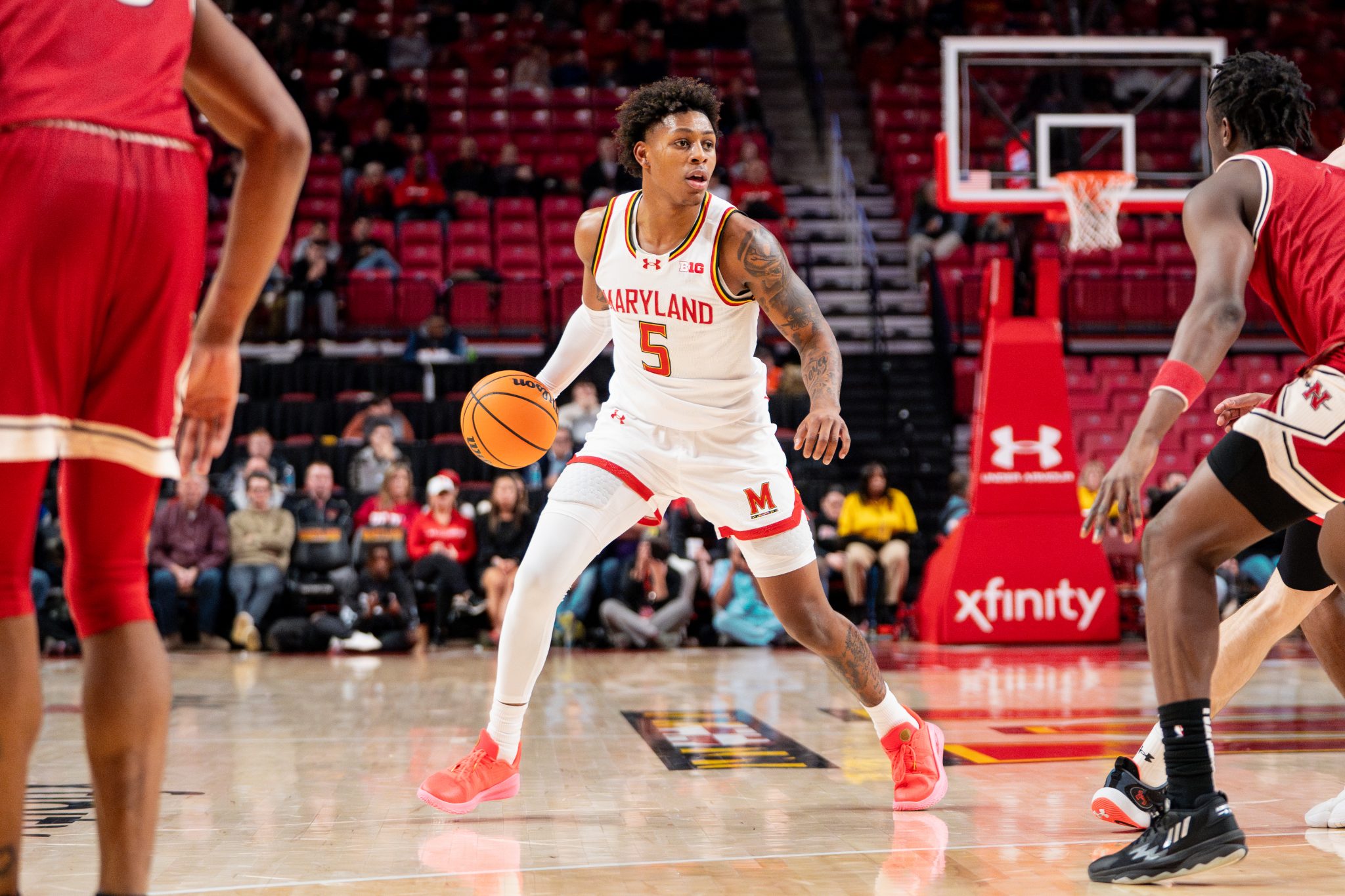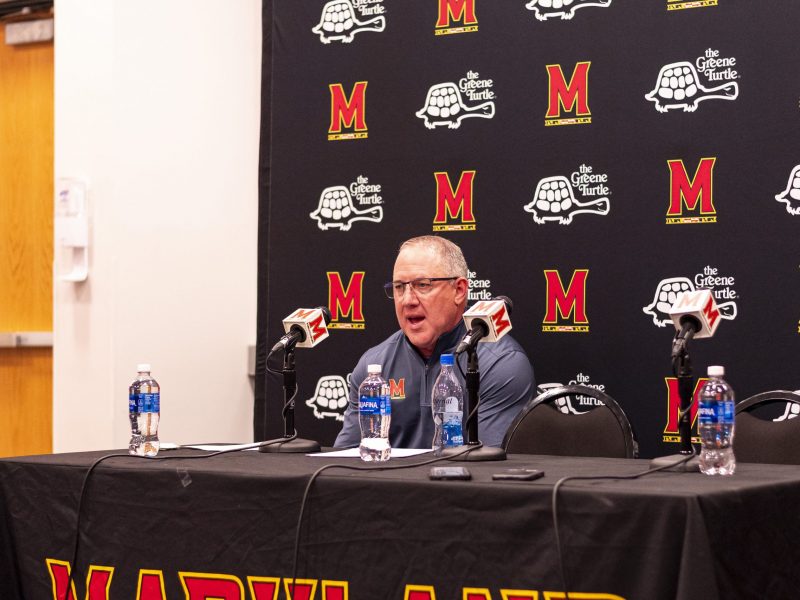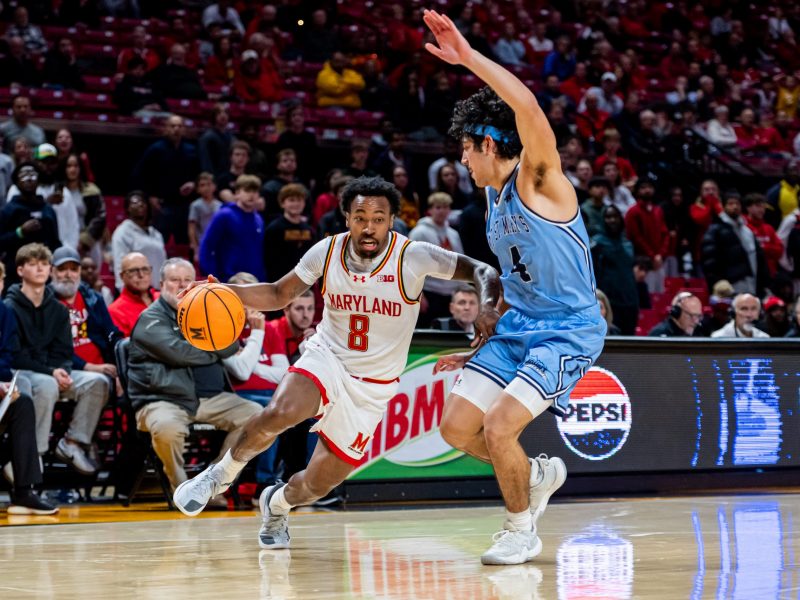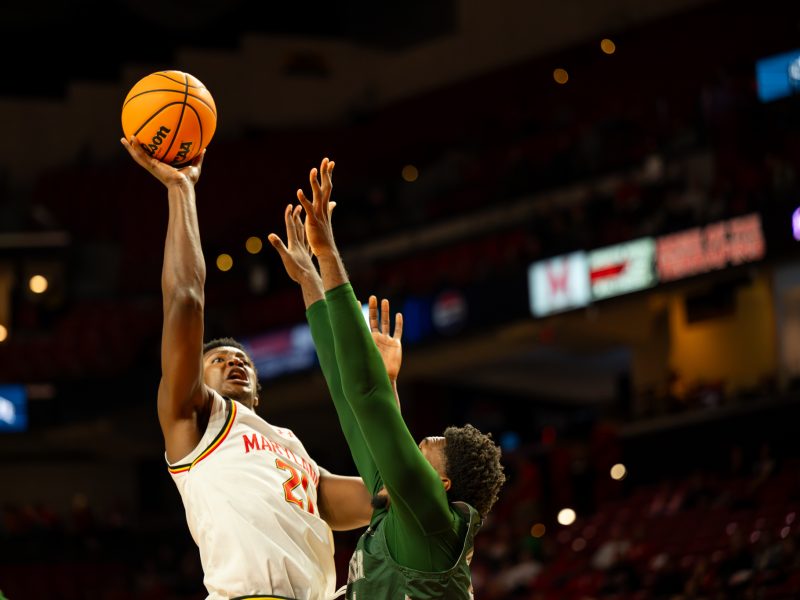By Eli Cohen and Harrison Rich
Maryland men’s basketball has lots of new faces, meaning there are also lots of unanswered questions ahead of the 2024-25 season.
The Diamondback’s men’s basketball reporters spoke with associate head coach David Cox and assistant coaches Greg Manning Jr. and Kevin Norris at the Terps’ media day last Tuesday to learn more about this year’s team.
Cox enters his third year on staff and his second as associate head coach. Manning is in his seventh season with the Terps and second as an assistant coach. Norris is a first-year assistant at Maryland after spending eight years at UCF.
Question: What is the biggest difference between this year’s and last year’s teams?
Answers: Size, shooting, depth and a “once in a blue moon talent”
“We’ve got size, we’ve got depth. And then we addressed the shooting woes of last year by bringing in Ja’Kobi [Gillespie], who was a near 40 percent shooter, bringing in Selton Miguel,” Cox said.
The pair of high-volume, high-efficiency shooters join a Maryland team that had the third-worst 3-point percentage among high-major teams and lost its three leaders in 3-pointers made.
Cox also said the Terps have 10 players who can produce. That includes added size with forward Tafara Gapare and centers Derik Queen and Braden Pierce.
Manning’s answer was more straightforward.
“One is probably Derik [Queen], he’s just one of those once-in-a-blue-moon talents. He’s kind of like Jalen Smith who we had a couple of years ago, just an elite big man that can do a lot of different things,” Manning said. “Derik’s a special player. He’s going to change this team.”
Question: Which newcomer — transfer or freshman — has impressed or surprised you the most?
Answers: Derik Queen (unanimous), Ja’Kobi Gillespie (Manning), Malachi Palmer (Cox)
Maryland brought in two freshmen and five transfers this offseason. The three coaches shared various names, but Queen was the common thread.
“Freshmen are gonna be freshmen, obviously,” Norris said. “With Derik, he’s just a little different.”
[Kevin Willard, Maryland men’s basketball embrace new roster construction philosophy]
Manning also gave a nod to Gillespie, who he said is shooting more than 40 percent from three in practice. The coach also said he wouldn’t be surprised if Gillespie leads the Big Ten in steals.
But the staff won’t hold Gillespie to unrealistic expectations while he’s stepping into the point guard role that All-Big Ten guard Jahmir Young vacated.
“He doesn’t have to be Jahmir,” Manning said. “I think we have more pieces around him this year that we didn’t have last year with Jahmir.”
Cox added that he’s been pleasantly surprised with Palmer, saying the freshman’s shooting has translated quicker than the staff expected. Palmer is physically ready for collegiate basketball and set the program’s freshman deadlift record.
Question: Which returning player has improved the most?
Answers: DeShawn Harris-Smith (unanimous), Braden Pierce (Cox, Norris)
Harris-Smith averaged seven points, four rebounds and two assists in a rocky freshman season. Manning and Norris complimented the efforts he’s made to improve his outside shooting, and Manning feels the game has slowed down for the former four-star recruit.
“Most guys take the biggest jump between their freshman and sophomore year, so I think DeShawn’s had a lot of improvement this summer,” Manning said. “If we can have a really good year out of DeShawn, we’ll be in great shape.”
Cox said Pierce, a 7-foot redshirt freshman, could compete for minutes with his outside shooting ability and improved frame.
“He had the longest way to go, but I think he’s made the biggest jump, and that’s been a pleasant surprise,” Cox said.
Question: What is the biggest X-factor that could define this team’s success?
Answers: Shooting, defense, Derik Queen
“We’re going have to shoot the ball better,” Cox said. “We’re also gonna have to maintain our high level of defense. … If we can do that and increase our shooting, then we’ll have a chance to go pretty far.”
Manning, once again, went with Queen. He said his passing ability will open up the court for Maryland’s guards, giving the team a different look offensively.
[Derik Queen sacrificed family for basketball. Maryland gives him both.]
“He’s just so talented. I think Derik allows us to play a lot of different ways,” Manning said. “You can throw it to him on the block, you can play it to him at the high post, you can give it to him at the top of the key. Just his decision making, he’s gonna free up guys.”
Question: How has the modern-day college basketball landscape changed your job as an assistant coach?
Answers: It’s complicated.
One of the biggest parts of an assistant coach’s job is recruiting. It’s difficult to sum up how their approach to it has changed, both with roster construction and the individual recruitment process.
“Everybody’s had to make adjustments … you used to try to establish somewhat genuine relationships,” Cox said. “All that’s for not now. Everything’s transactional. You lose a lot when relationships start to become transactional.”
Norris also acknowledged differences but had a more positive spin on the changed landscape. He said NIL has made it easier to identify if a player has genuine interest in the program.
“The questions they ask, is the focus about the money, or is it about winning? Because at the end of the day, the money is a short-term pitch,” Norris said. “Usually players that come to the University of Maryland want to be professional basketball players, so money shouldn’t really be the biggest reason.”



